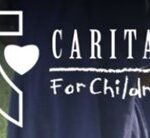Franciscan Sister of Christian Charity Sister Kathleen Murphy comments on Pope Francis’ December prayer intention that volunteer non-profit organizations committed to human development find people dedicated to the common good and ceaselessly seek out new paths to international cooperation.
December finds us wrapped in the purple of Advent with its growing sense of light. This is the one time of year when we hear about many “good news” stories of generosity and care. This reality makes Pope Francis’ intention for the month particularly apropos. The intention is: That volunteer non-profit organizations committed to human development find people dedicated to the common good and ceaselessly seek out new paths to international cooperation.
Despite the overwhelming level of violence and intolerance that bombards us daily, we cannot deny the fact that God’s love lives in the hearts of countless individuals and groups dedicated to charitable activities. In line with the Pope’s thought, we look at just three such organizations that identify as Catholic. You will note that the section on each group is begun with their website so that you can learn more about their work if you wish.
 Caritas.us
Caritas.us
Following up on last month’s intention, this group focuses on helping children in need. Their Mission and Vision Statements offer a clear picture of their work. Mission Statement: As a Catholic ministry, our mission is to build global relationships that reflect the universal call to “love God with one’s whole heart and one’s neighbor as oneself.” (Matt. 22:37-40).
Vision Statement: The vision of CARITAS For Children is to create a worldwide community of sponsors and beneficiaries, where relationships of compassion, generosity, and love foster the practice of true charity…a “living caritas.” The call to live Gospel values is surely alive in the ministry of this group.
https://www.monafoundation.org
 Next, we take a look at the nature and work of the Mona Foundation. This group works for change and growth with a high level of local involvement. They describe their efforts as follows: We support grassroots initiatives around the world that educate all children, empower women and girls, and emphasize service to the community. These include schools in economically disadvantaged areas which focus on quality of learning and teaching, fine arts and character development to train capable, ethical and altruistic leaders who contribute to the betterment of their families, communities, and ultimately their nation.
Next, we take a look at the nature and work of the Mona Foundation. This group works for change and growth with a high level of local involvement. They describe their efforts as follows: We support grassroots initiatives around the world that educate all children, empower women and girls, and emphasize service to the community. These include schools in economically disadvantaged areas which focus on quality of learning and teaching, fine arts and character development to train capable, ethical and altruistic leaders who contribute to the betterment of their families, communities, and ultimately their nation.
They have a well-developed set of core principles that form their theory of change. These principles are as follows:
- Change is sustainable when the local community is the principal actor in defining, analyzing and solving its own problems.
- Change is a process, not an event, and requires long-term commitment.
- Change requires capacity-building at the grassroots.
https://laymissionhelpers.org
 Finally, we look at the Lay Mission-Helpers. This group is a clearing house of sorts where one can go to find an organization that sponsors Mission workers in various locations doing various types of service. Their founding story is worthy of our consideration.
Finally, we look at the Lay Mission-Helpers. This group is a clearing house of sorts where one can go to find an organization that sponsors Mission workers in various locations doing various types of service. Their founding story is worthy of our consideration.
LMH had its humble beginnings through a transformative event in the life of Msgr. Anthony Brouwers, the then Los Angeles Archdiocesan Director of the Propagation of the Faith. In 1954, Msgr. Brouwers traveled to Lagos, Nigeria for the Marian Congress. After the Congress, he traveled throughout Africa by train and boat, on foot, in trucks, jeeps and by motorcycle. He met with sisters, priests and bishops who were burdened with hundreds of tasks they were neither trained, nor in many cases, qualified to do—everything from caring for the sick, to publishing newspapers, trying to lay bricks, pulling teeth and repairing diesel engines.
Returning to Los Angeles in 1955 he founded the Lay Mission-Helpers Association (LMH) to help with these many needs. LMH became the first program in the United States to send lay Catholics to serve in the foreign missions.
Those wishing to work with LMH must participate in a four-month Formation Program. It is designed to help candidates develop the tools necessary to succeed in their mission service. The program includes spiritual development, study of cross-cultural issues, and personal development in communication and healthy community living. Again, this seems to be a group walking in the footsteps of Jesus.
We end our reflections with another phrase from our daily prayer. We consider the words, Grace fills our hearts, and we receive a pledge of the glory to come. As we pray about the dedicated work and spirit of just these few groups, we can see grace at work in our world. The good work these organizations do is truly a taste of the kingdom and a pledge of the glory to come. Let us bring them and many others who serve similarly to the Eucharist with us daily. Let us pray that the Gospel will continue to be their guide and that the Eucharist will nourish and strengthen them in their service.


